The Two Towers: Difference between revisions
(Moar details) |
No edit summary |
||
| (7 intermediate revisions by the same user not shown) | |||
| Line 2: | Line 2: | ||
{{NavBar|The Two Towers|[[Main Page]]|[[Realms of the Elf-lords]]|[[Battle of Helm's Deep]]}} | {{NavBar|The Two Towers|[[Main Page]]|[[Realms of the Elf-lords]]|[[Battle of Helm's Deep]]}} | ||
{{SetTabs}} | {{SetTabs}} | ||
{{Set | {{Set | ||
|ID=4 | |ID=4 | ||
| Line 13: | Line 12: | ||
|Notes= | |Notes= | ||
}} | }} | ||
[[File:LOTR-EN04S103.0_card.jpg|frame|right|{{Card|Treebeard, Earthborn}} interacted with the new [[Bouncing Hobbits]] archetype.|link=Treebeard, Earthborn (4R103)]] | |||
Set 4, '''The Two Towers''' (or '''TTT''') is the second base set of the Lord of the Rings Trading Card Game, and the fourth expansion overall. It was released on November 6, 2002 (one month before the movie of the same name), as the first set of [[Towers Block]]. It introduced the Ents, the Riders of Rohan, Dunlendings, Southrons, and Easterlings. Overall, the set had little to no power creep, and was well-produced, making it easier to find sealed product than the [[Realms of the Elf-lords]] set that came immediately before it. | |||
= | == Notable Cards == | ||
The | * {{Card|The One Ring, Answer To All Riddles}} | ||
* {{Card|Eomer, Third Marshal of Riddermark}} | |||
* {{Card|Faramir, Son of Denethor}} | |||
* {{Card|Grima, Wormtongue}} | |||
* {{Card|Legolas, Dauntless Hunter}} | |||
= | == Starter Decks == | ||
* [[Starter_Decks/Towers_Block#TTT_Aragorn_Starter_Deck|Aragorn Starter Deck]]: {{C|Gondor}} / {{C|Dunland}} | |||
* [[Starter_Decks/Towers_Block#TTT_Theoden_Starter_Deck|Rohan Starter Deck]]: {{C|Rohan}} / {{C|Isengard}} | |||
* [[Starter_Decks/Towers_Block#TTT_Deluxe_Starter_Set|Deluxe Starter Set]]: {{C|Gandalf}} / {{C|Shire}} / {{C|Raider}} | |||
== | == Themes and Mechanics == | ||
Like [[The Fellowship of the Ring]] before it, New Line disallowed certain concepts from being represented on cards which were considered "spoilers" for the film. The most famous of these was [[Gollum]], who wouldn't premier until the next set of [[Battle of Helm's Deep]]. | |||
Rumor has it that Decipher originally tinkered with producing a brand new game rather than continue to extend the mechanics of the TCG, which which were tied closely to the events and structure of [[The Fellowship of the Ring]]. This would have been similar to what they did for Star Wars Episode 1, where its content was kept entirely within the [https://www.starwarsccg.org/young-jedi/ Young Jedi TCG] instead of the SWCCG (at first, anyway). Whether or not those rumors have any truth to them, the TTT set struggled to implement mechanics which represented the plot of the film and book as well as FOTR had done before it. | |||
The | The most impactful new mechanic involves the split [[Ring-bound]] and [[Unbound]] labels for companions, which was an attempt to represent the story split between Frodo in Mordor and everyone else in Rohan. Ring-bound companions (Ithilien [[Ranger]]s, Frodo, Sam, and later {{Smeagol}}) were part of Frodo's storyline, while unbound companions were off fighting in Rohan. {{C|Raider}} cards would target and gain bonuses from fighting Ring-bound companions, while {{C|Isengard}} and {{C|Dunland}} cards would target unbound companions. | ||
This mechanic endured, if only because having a shorthand of "unbound" instead of "(except the Ring-bearer)" was convenient for game design. However, even with the number of culture-level designs around targeting specific subsets of individuals, you had the issue of a {{C|Rohan}} fellowship dragging Frodo with them as their [[Ring-bearer]], or a Ring-bound Ranger fellowship trekking through Rohan, which remained thematic issues that made TTT more ill-fitted to the game mechanics thematically than FOTR was. | |||
Also related to the Ring-bound/unbound split was the treatment of the site path--the [[Towers Block]] site path in general follows the "unbound" plotline, but various "ring-bound" conditions were included that offered flavor relating to Frodo's journey at specific sites. These cards include: | |||
* {{Card|Cliffs of Emyn Muil}} | |||
* {{Card|Eastern Emyn Muil}} | |||
* {{Card|Forests of Ithilien}} | |||
* {{Card|Henneth Annun}} | |||
* {{Card|Ruins of Osgiliath}} | |||
* {{Card|Ithilien Wilderness}} | |||
== New Cultures == | |||
This set introduced three new cultures: | |||
* {{C|Raider}}, representing the evil nations of Men sworn to serve Sauron | |||
* {{C|Dunland}}, a faction of evil Men influenced by Saruman (and only split off from Raider because Decipher thought that 2 [[Shadow]] cultures was too few) | |||
* {{C|Rohan}}, the kingdom of horsemen led by {{Theoden}} and his heirs {{Eomer}} and {{Eowyn}} | |||
It was also the first set to contain zero cards from already-established cultures {{C|Moria}}, {{C|Ringwraith}}, and {{C|Sauron}}. | |||
== New [[Loaded Keywords]] == | |||
The Two Towers introduced four new loaded keywords: | |||
* [[Ambush]], which appeared in the Southron subculture of the {{C|Raider}} culture | |||
* [[Ring-bound]], which retroactively applied to all versions of [[Frodo]] and [[Sam]] and was used to create the Ring-bound [[Ranger]] subculture in {{C|Gondor}} | |||
* [[Unbound]], which was never written as a keyword on any companions, but meant "not ring-bound" | |||
* [[Unhasty]], which appeared in this set only on the two versions of [[Treebeard]] | |||
== New [[Unloaded Keywords]] == | |||
* | The Two Towers introduced seven new unloaded keywords: | ||
* | * [[Battleground]], on sites | ||
* | * [[Easterling]], on {{C|Raider}} minions | ||
* | * [[Ent]], a new race in the {{C|Gandalf}} culture | ||
* | * [[Machine]], on {{C|Isengard}} possessions | ||
* [[Southron]], on {{C|Raider}} minions | |||
* [[Valiant]], on {{C|Rohan}} companions | |||
* [[Villager]], on {{C|Rohan}} allies | |||
= | == Other mechanics == | ||
The Two Towers introduced several other new mechanics: | |||
* [[Site Control]] and liberation | |||
* [[Culture Token]]s | |||
* Subtitles on possessions, artifacts, and conditions (compare {{Card|Ranger's Sword, Blade of Aragorn}} with {{Card|Ranger's Sword}} | |||
* Allies with multiple home sites, rather than just 1 | |||
* [[Mount]]s and the pseudo-keyword "[[Mounted]]" | |||
* A new site path, which completely replaced the [[Fellowship Block]] site path | |||
=== | == Reprinted cards == | ||
* {{Card|4C2}} | |||
* | ** Previously: {{Card|1C2}} | ||
* | * {{Card|4U62}} | ||
** Previously: {{Card|1C41}} | |||
* {{Card|4C129}} | |||
** Previously: {{Card|1C110}} | |||
* {{Card|4C207}} | |||
** Previously: {{Card|1C158}} | |||
* {{Card|4C306}} | |||
** Previously: {{Card|1C299}} | |||
== Similar sites == | |||
=== | |||
Because The Two Towers introduced a completely new site path, the set included some sites very similar to sites previously released in Fellowship Block in order to enable the same strategies. | |||
* {{Card|Eastemnet Downs}} (punishes large fellowships, similar to {{Card|East Road}}) | |||
* | * {{Card|The Riddermark}} (allows you to [[tutor]] [[Aragorn]] from your draw deck, similar to {{Card|The Prancing Pony}}) | ||
* {{Card|White Mountains}} (similar game text to {{Card|Dwarrowdelf Chamber}} and {{Card|Moria Lake}}) | |||
* | * {{Card|Hornburg Causeway}} (similar game text to {{Card|Anduin Banks}}) | ||
* | * {{Card|King's Room}} (similar game text to {{Card|Silverlode Banks}}) | ||
* | |||
{{Set Table}} | {{Set Table}} | ||
Latest revision as of 10:38, 8 January 2023
Back to Main Page |
Battle of Helm's Deep |
| The Two Towers | |
|---|---|
| ID | 4 |
| Name | The Two Towers |
| Creator | Decipher |
| Release Date | 2002-11-06 |
| Is Official | yes |
| Platforms | Paper • LotR-O • GEMP • mLOTRO • Tabletop Simulator • Lackey • gccg |
| Notes | |
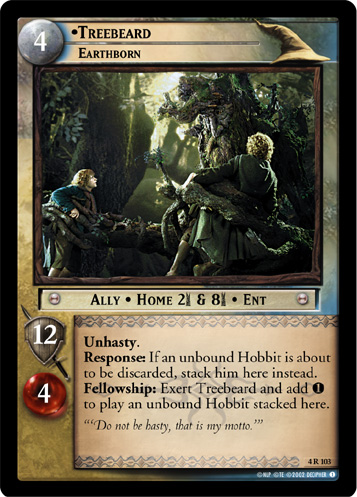
 interacted with the new Bouncing Hobbits archetype.
interacted with the new Bouncing Hobbits archetype.Set 4, The Two Towers (or TTT) is the second base set of the Lord of the Rings Trading Card Game, and the fourth expansion overall. It was released on November 6, 2002 (one month before the movie of the same name), as the first set of Towers Block. It introduced the Ents, the Riders of Rohan, Dunlendings, Southrons, and Easterlings. Overall, the set had little to no power creep, and was well-produced, making it easier to find sealed product than the Realms of the Elf-lords set that came immediately before it.
Notable Cards[edit]
- The One Ring, Answer To All Riddles (4R1)
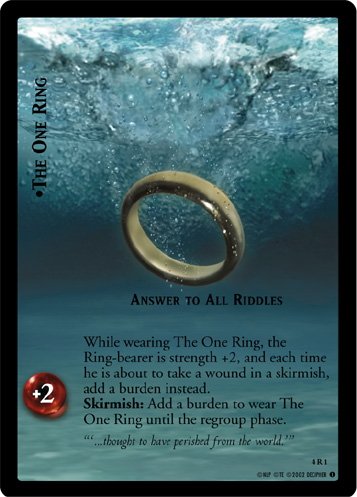
- Éomer, Third Marshal of Riddermark (4R267)
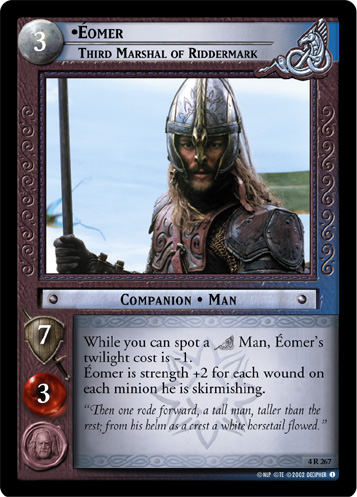
- Faramir, Son of Denethor (4C117)
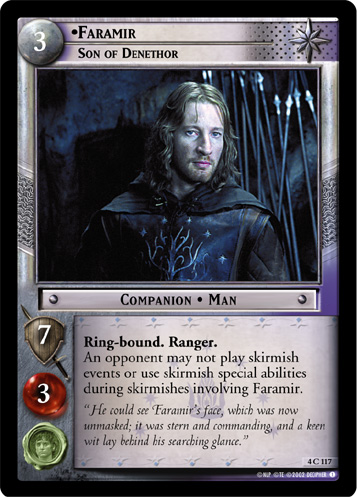
- Gríma, Wormtongue (4R154)
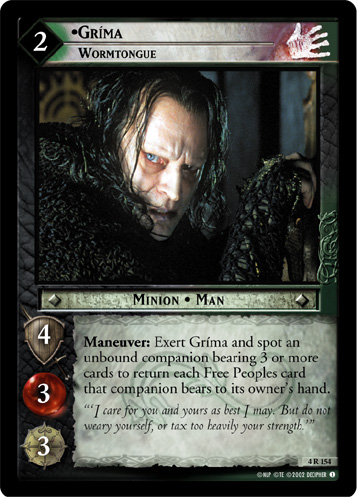
- Legolas, Dauntless Hunter (4R73)
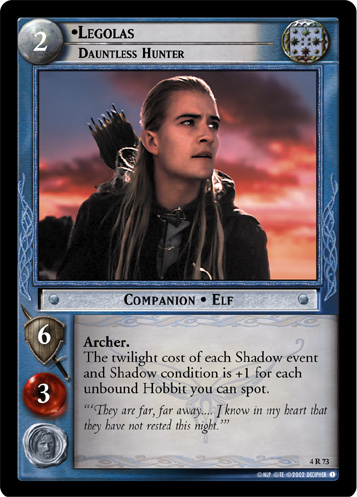
Starter Decks[edit]
- Aragorn Starter Deck:
Gondor /
Dunland
- Rohan Starter Deck:
Rohan /
Isengard
- Deluxe Starter Set:
Gandalf /
Shire /
Raider
Themes and Mechanics[edit]
Like The Fellowship of the Ring before it, New Line disallowed certain concepts from being represented on cards which were considered "spoilers" for the film. The most famous of these was Gollum, who wouldn't premier until the next set of Battle of Helm's Deep.
Rumor has it that Decipher originally tinkered with producing a brand new game rather than continue to extend the mechanics of the TCG, which which were tied closely to the events and structure of The Fellowship of the Ring. This would have been similar to what they did for Star Wars Episode 1, where its content was kept entirely within the Young Jedi TCG instead of the SWCCG (at first, anyway). Whether or not those rumors have any truth to them, the TTT set struggled to implement mechanics which represented the plot of the film and book as well as FOTR had done before it.
The most impactful new mechanic involves the split Ring-bound and Unbound labels for companions, which was an attempt to represent the story split between Frodo in Mordor and everyone else in Rohan. Ring-bound companions (Ithilien Rangers, Frodo, Sam, and later Sméagol) were part of Frodo's storyline, while unbound companions were off fighting in Rohan. Raider cards would target and gain bonuses from fighting Ring-bound companions, while
Isengard and
Dunland cards would target unbound companions.
This mechanic endured, if only because having a shorthand of "unbound" instead of "(except the Ring-bearer)" was convenient for game design. However, even with the number of culture-level designs around targeting specific subsets of individuals, you had the issue of a Rohan fellowship dragging Frodo with them as their Ring-bearer, or a Ring-bound Ranger fellowship trekking through Rohan, which remained thematic issues that made TTT more ill-fitted to the game mechanics thematically than FOTR was.
Also related to the Ring-bound/unbound split was the treatment of the site path--the Towers Block site path in general follows the "unbound" plotline, but various "ring-bound" conditions were included that offered flavor relating to Frodo's journey at specific sites. These cards include:
- Cliffs of Emyn Muil (4R299)
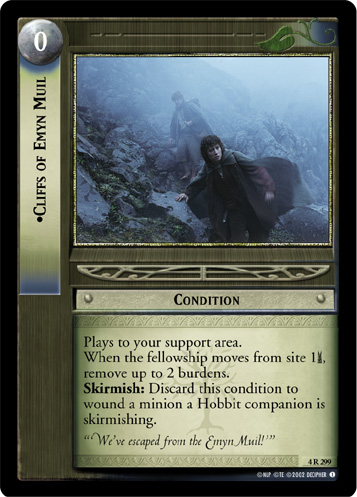
- Eastern Emyn Muil (4R231)
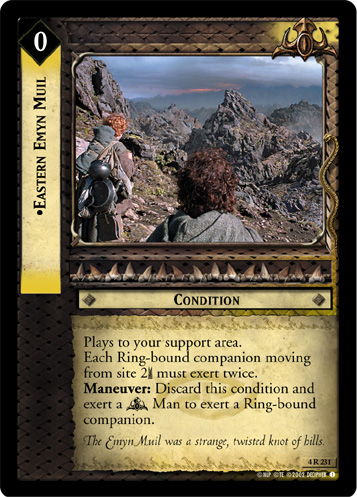
- Forests of Ithilien (4R121)
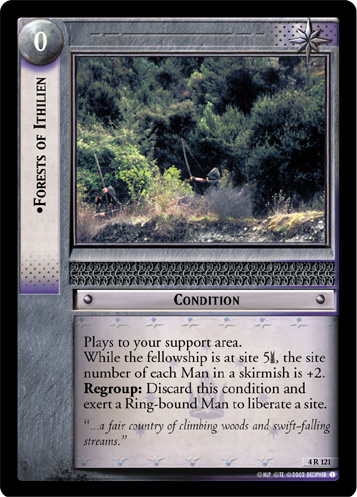
- Henneth Annûn (4R125)
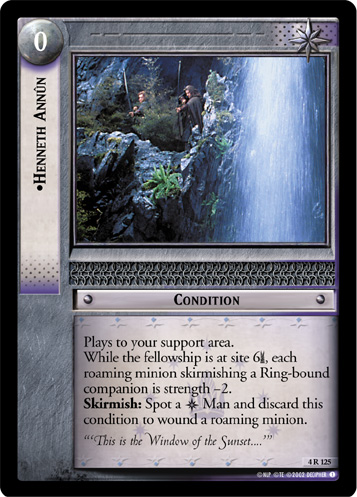
- Ruins of Osgiliath (4R133)
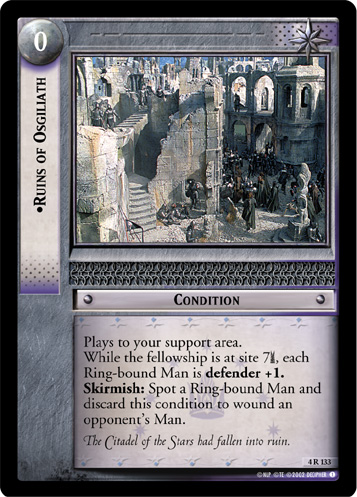
- Ithilien Wilderness (4R237)
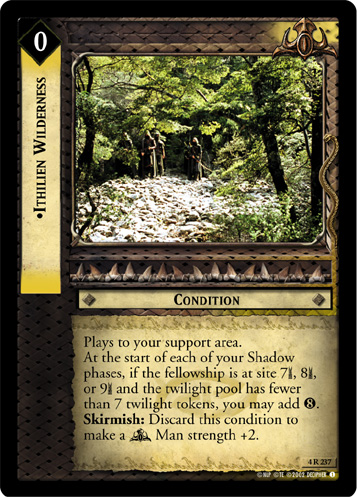
New Cultures[edit]
This set introduced three new cultures:
Raider, representing the evil nations of Men sworn to serve Sauron
Dunland, a faction of evil Men influenced by Saruman (and only split off from Raider because Decipher thought that 2 Shadow cultures was too few)
Rohan, the kingdom of horsemen led by Théoden and his heirs Éomer and Éowyn
It was also the first set to contain zero cards from already-established cultures Moria,
Ringwraith, and
Sauron.
New Loaded Keywords[edit]
The Two Towers introduced four new loaded keywords:
- Ambush, which appeared in the Southron subculture of the
Raider culture
- Ring-bound, which retroactively applied to all versions of Frodo and Sam and was used to create the Ring-bound Ranger subculture in
Gondor
- Unbound, which was never written as a keyword on any companions, but meant "not ring-bound"
- Unhasty, which appeared in this set only on the two versions of Treebeard
New Unloaded Keywords[edit]
The Two Towers introduced seven new unloaded keywords:
- Battleground, on sites
- Easterling, on
Raider minions
- Ent, a new race in the
Gandalf culture
- Machine, on
Isengard possessions
- Southron, on
Raider minions
- Valiant, on
Rohan companions
- Villager, on
Rohan allies
Other mechanics[edit]
The Two Towers introduced several other new mechanics:
- Site Control and liberation
- Culture Tokens
- Subtitles on possessions, artifacts, and conditions (compare Ranger's Sword, Blade of Aragorn (4U132)
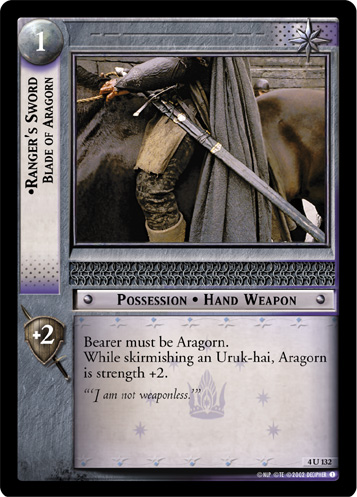 with Ranger’s Sword (1U112)
with Ranger’s Sword (1U112)
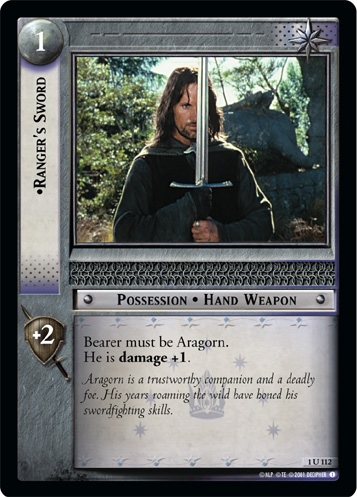
- Allies with multiple home sites, rather than just 1
- Mounts and the pseudo-keyword "Mounted"
- A new site path, which completely replaced the Fellowship Block site path
Reprinted cards[edit]
- The One Ring, The Ruling Ring (4C2)
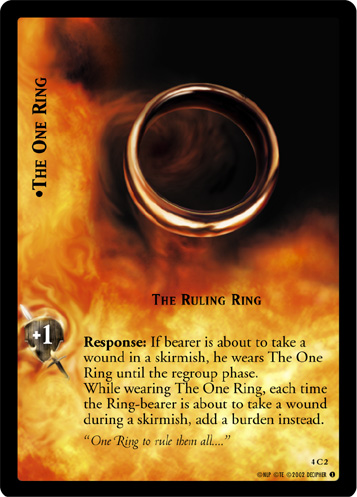
- Previously: The One Ring, The Ruling Ring (1C2)
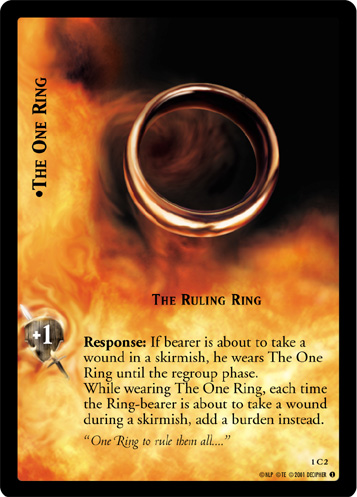
- Previously: The One Ring, The Ruling Ring (1C2)
- Elven Bow (4U62)
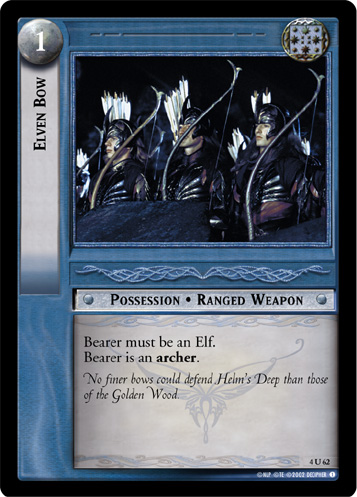
- Previously: Elven Bow (1C41)
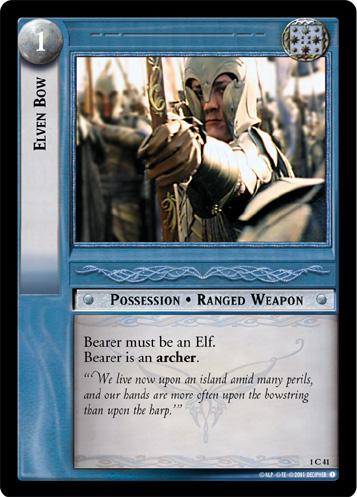
- Previously: Elven Bow (1C41)
- Pathfinder (4C129)
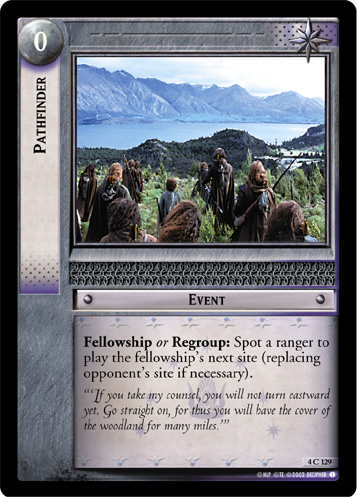
- Previously: Pathfinder (1C110)
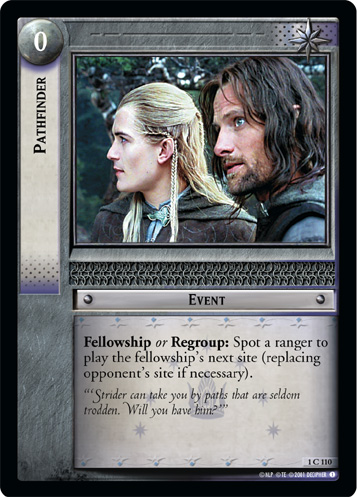
- Previously: Pathfinder (1C110)
- Uruk-hai Raiding Party (4C207)
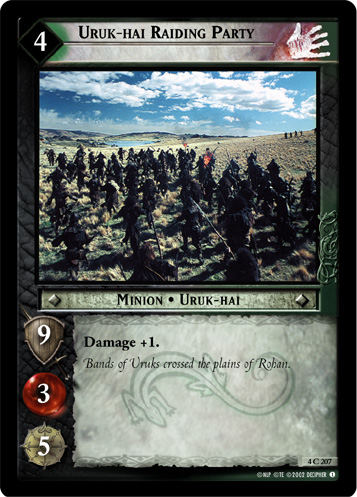
- Previously: Uruk-hai Raiding Party (1C158)
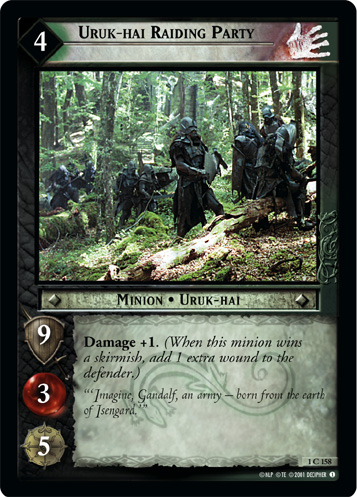
- Previously: Uruk-hai Raiding Party (1C158)
- Hobbit Sword (4C306)
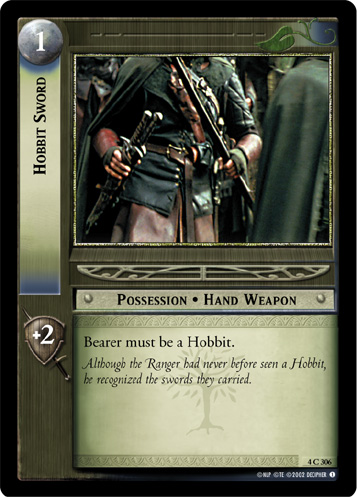
- Previously: Hobbit Sword (1C299)
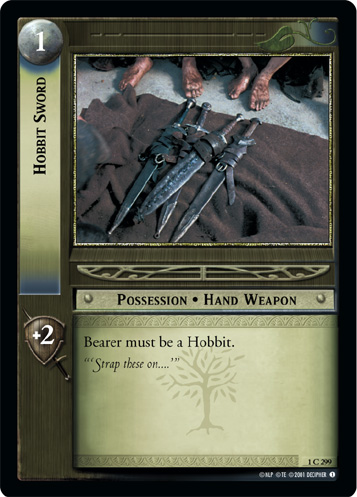
- Previously: Hobbit Sword (1C299)
Similar sites[edit]
Because The Two Towers introduced a completely new site path, the set included some sites very similar to sites previously released in Fellowship Block in order to enable the same strategies.
- Eastemnet Downs (4U324)
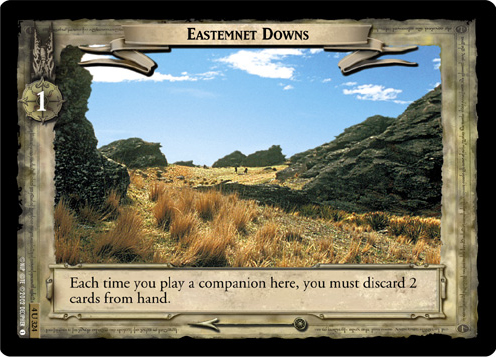 (punishes large fellowships, similar to East Road (1U320)
(punishes large fellowships, similar to East Road (1U320)
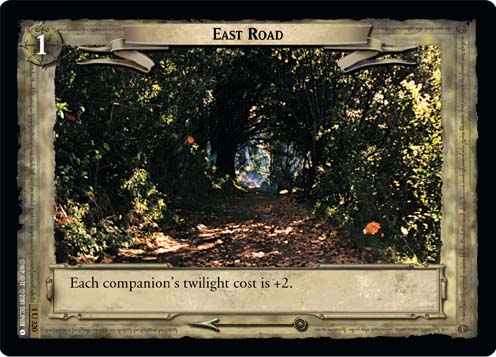 )
) - The Riddermark (4U328)
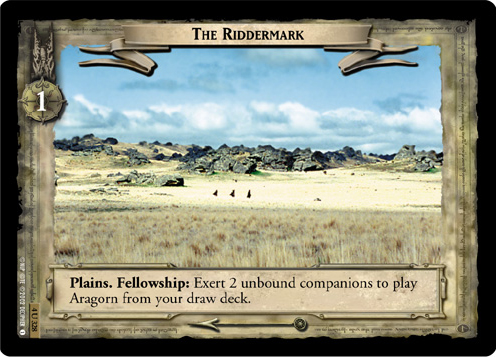 (allows you to tutor Aragorn from your draw deck, similar to The Prancing Pony (1U324)
(allows you to tutor Aragorn from your draw deck, similar to The Prancing Pony (1U324)
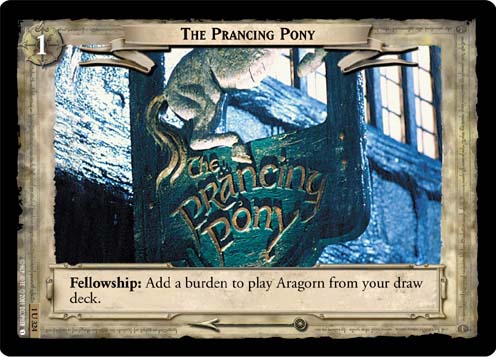 )
) - White Mountains (4U345)
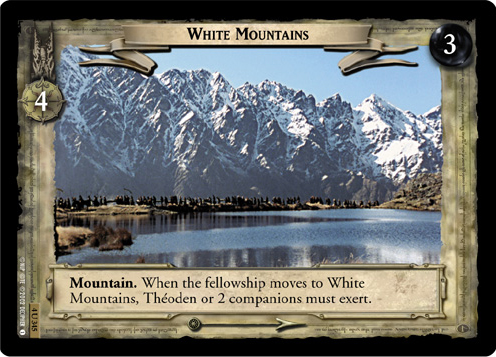 (similar game text to Dwarrowdelf Chamber (1U344)
(similar game text to Dwarrowdelf Chamber (1U344)
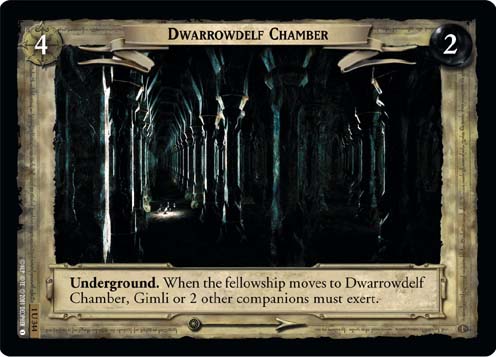 and Moria Lake (1C346)
and Moria Lake (1C346)
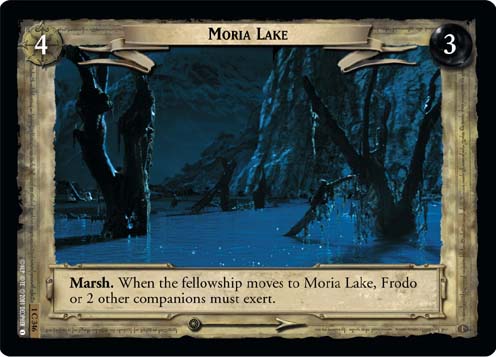 )
) - Hornburg Causeway (4U356)
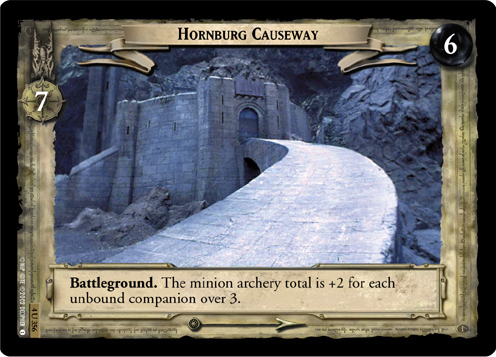 (similar game text to Anduin Banks (1C356)
(similar game text to Anduin Banks (1C356)
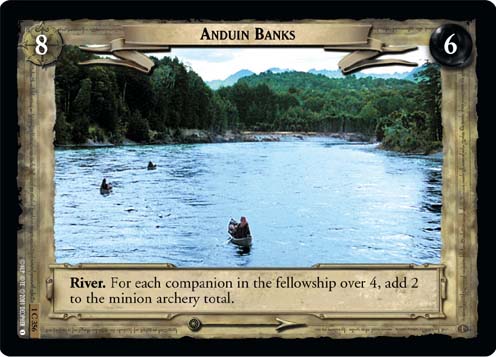 )
) - King's Room (4U357)
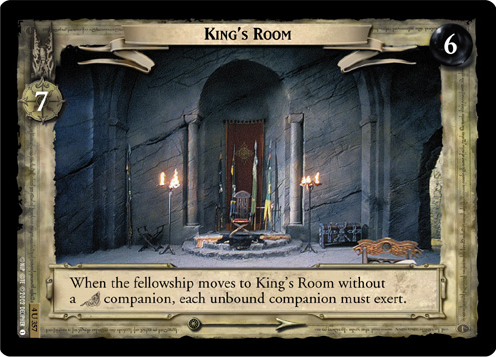 (similar game text to Silverlode Banks (1U355)
(similar game text to Silverlode Banks (1U355)
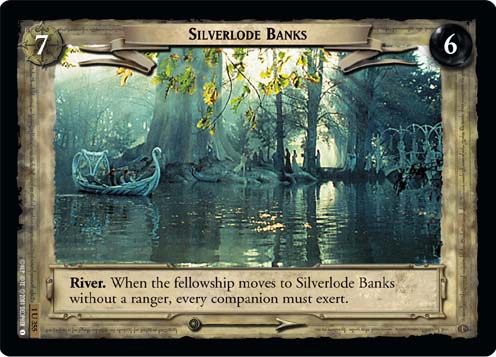 )
)